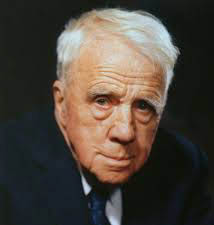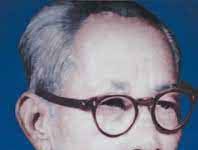Robert Frost-Brief Biography
Robert Frost
Robert FrostBrief Biography
On the 26th of March 1874, there in San Francisco was born a child, who later on took to writing poetry on ordinary rural themes in a simple style and became a world-wide famous poe – the name of the child was Robert Frost. He is the only poet in the world who was conferred as many as forty honorary degrees, after hailing him as a great poet, by many universities around the world. Even more, he is the only poet in the world, who for poetry won the famous Pulitzer Prize four times which made him a legend during his lifetime.
His father William Prescott Frost belonged to the state called New England, the inhabitants of which state are familiarly called ‘Yankees’. His mother Isabelle Moodie was a Scot and had come to America from Edinburgh. His childhood was somewhat strange blessed with parental love but fraught with excitement and tragedy. His father died of tuberculosis at the early age of thirty-four while Robert Frost was eleven. His mother was always afraid that her son Robert Frost might catch his father’s tendencies to tuberculosis.
After the death of his father, Robert’s life of comfort and freedom came to an end. His widow mother took her son to New England where his ancestors lived. They went to Massachusetts where Robert Frost’s grandparents lived. In New Hampshire, Frost’s widow mother got a job in a small school. Here to say that Robert frost had a younger sister also. Both brother and sister attended their mother’s school. There, besides his schooling, Robert had to do all kinds of odd jobs to supplement his mother’s income. After attending about three years in his mother’s school, Robert went to the High School at Lawrence. In the beginning, Robert Frost did not show much inclination for study, but during his four years stay at Lawrence High School, he showed his good career in learning. There, in Lawrence High School, he fell in love with poetry and began to write his own verses. His first poem appeared in the High School Bulletin when he was fifteen. He graduated at the age of seventeen. When he was about nineteen, his first professional poem was accepted by a magazine of national circulation and received a payment of fifteen dollars. During that time, he tried to earn his livelihood in various ways. He worked in mills, took to newspaper reporting, and taught in schools, and in his leisure hours, he wrote verses. In 1894, his youthful poem ‘My Butterfly’ was published in the ‘New York Independent’ and then soon afterward he published his lyrics in a booklet entitled ‘Twilight’. During this time, while he was in search of a livelihood, he married a pretty girl by the name of Elinor Miriam White, a classmate at Lawrence High School. Two years after his marriage, he went to Harvard University and remained there until he was twenty-four years. There he studied philosophy and the classics.
By then, a son was born to him and then he dropped out of Harvard University without completing his study. In 1899 his second child, a daughter, was born, but a tragic event occurred in the same year as his son died suddenly. In November of the same year, he lost his mother who was the victim of cancer. Then with a pathetic heart, after the counsel of his wife, he along with his little family went to New Hampshire, where he bought a farm and began to live somehow.
But after living for several years there, he became weary of life and decided to sail for England. His wife supported this and as a result, he sold his firm and settled in Beacons Field, Buckinghamshire. There, in Buckinghamshire, he met the poet-dramatist Lascelles Abercrombie and the poet Wilson Gibson as his neighbors. There he always had an idea in his mind to have the luck of publishing his poetry. Soon he found a publisher and his first volume of lyrics ‘A Boy’s Will’ got accepted by Mrs. David and Nutt and was published in 1913. In 1914, his second volume of poetry ‘The North Boston’ was also accepted by some publishers that attracted so much attention that it was also published in America soon after.
In February 1915 Robert Frost returned to America and found that his poetry book ‘The North of Boston’ was on sale everywhere and thus by the general reader community he was hailed as a leader of ‘The New Era in American Poetry’.
After returning to America, Frost bought a farm in New Hampshire, and there he lived for five years earning his livelihood by farming, teaching and writing. In 1916 he published his third poetry book ‘Mountain Interval’ and from onward to 1936 he spent much of his time in various colleges and universities. In 1938, while the poet was at the height of his career, his wife died. The death of his wife had broken his heart but it could not debar him from his literary production.
Subsequently, he published his other poetry books one after the other; these were- New Hampshire (1923), West Running Brook (1928), A Further Range (1936), A Witness Three (1942), and Steeple-Bush (1947). Besides these books of poetry, he wrote two plays as – ‘A Masque of Reason’ (1945) and ‘A Masque of Mercy’ (1947).
Realism is the main theme of his poetry. He took to writing poetry not with innovation but with traditional theme and style but with a fundamental understanding imposing moral meaning in poetry. His poetry begins in delight but ends with wisdom. Realism is the main basis of his theme. Though there is a romantic note in his poetry, yet his romanticism is not a mere fancy, but a portrayal of a natural phenomenon that is sensitive but not Wordsworthian or not like that of other Romantic poets. Realism excels his romanticism. He was, in short, a poet of rural life not of urban life. As a poet, his place is after only Walt Whitman, who was a poet of democratic urban life, but Robert Frost was a poet of natural naive country life.
The language and style of his poetry are simple and easy. He adopted the dramatic monologue of Robert Browning as the medium of expression. Most of his poems bear dual meanings- superficial and deeper.
Frost won many honours and awards in his life. He was awarded the Pulitzer Prize for poetry four times. He is the only poet to achieve this fourfold distinction. He was given honorary degrees by a number of colleges and universities including Oxford and Cambridge. He won the Gold Medal from the National Institute of Arts and Literature. President Kennedy sent him to the Soviet Union as a representative of the American people.
This great and world-wide famous poet Robert Frost died in 1963 at the age of eighty-eight with the contentment of honour and reputation.
To sum up, this poet was a poet of real life who had the power of both romantic feeling and realistic idealism. He will have been living, though his body is no more, like Virgil or Theocritus as a legend through the centuries. 0 0 0
Robert Frost
N.B. The article ‘Robert Frost-Brief Biography’ originally belongs to the book ‘The World Writers-Brief Biographies‘ by Menonim Menonimus.
Robert Frost
Books of Composition by M. Menonimus:
- Advertisement Writing
- Amplification Writing
- Note Making
- Paragraph Writing
- Notice Writing
- Passage Comprehension
- The Art of Poster Writing
- The Art of Letter Writing
- Report Writing
- Story Writing
- Substance Writing
- School Essays Part-I
- School Essays Part-II
- School English Grammar Part-I
- School English Grammar Part-II..
Books of S. Story by M. Menonimus:
Related Search:
- Lives of Poets
- Writers’ Lives
- Top Hundred Writers
- Best Writers of All Time
- Most Eminent English Poets











